IRGC Aerospace Commander Asserts Strength Amid Dialogue With US
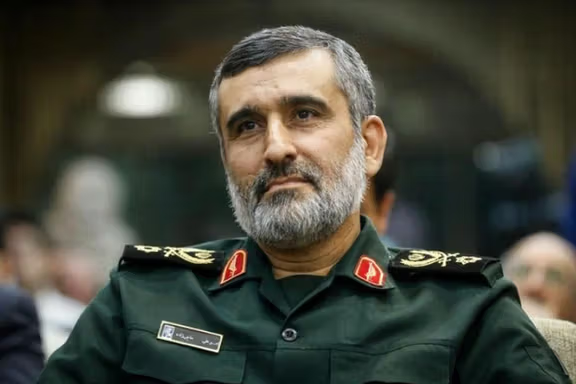
The commander of the Aerospace Force of the IRGC has declared that the US is engaging in diplomatic talks with Iran using a "language of request and plea" amid attacks on US bases.

The commander of the Aerospace Force of the IRGC has declared that the US is engaging in diplomatic talks with Iran using a "language of request and plea" amid attacks on US bases.
Amir-Ali Hajizadeh claimed on Monday that “Iran is currently at the pinnacle of its power and cannot be threatened".
Since Iran-backed Hamas declared war on Israel on October 7 and the US supported Israel's right to defend itself, at least 40 proxy attacks have taken place against US bases in Iraq and Syria. On Sunday, the US ordered two retaliatory attacks. Defense Secretary Lloyd Austin said the strikes targeted Iran’s Revolutionary Guard and affiliated militia groups.
Hajizadeh also acknowledged the expanding conflict in the region, with Lebanon becoming embroiled. Hajizadeh speculated on the possibility of further escalation, stating, "The future is uncertain, but Iran is prepared for all circumstances."
The recent stance from Hajizadeh sharply contrasts with his remarks from the previous week, where he had suggested a degree of apprehension. He revealed that Iran chose not to retaliate against the US for the killing of Quds Force commander Qassem Soleimani in 2020, deeming it illogical.
A video released by Etemadonline showed Hajizadeh explaining that a war at that time could have resulted in significant casualties for Iran, both civilian and military, and set the nation back by two decades.
The decision to avoid full-scale confrontation with the US was based on the assessment that such a conflict would not yield the desired results, according to Hajizadeh.
Iranian officials continue to issue threats against the Jewish state. Iran's long standing support for groups like Hamas, coupled with its decades-long call for the destruction of Israel, adds to the complexity of the geopolitical landscape in the Middle East.
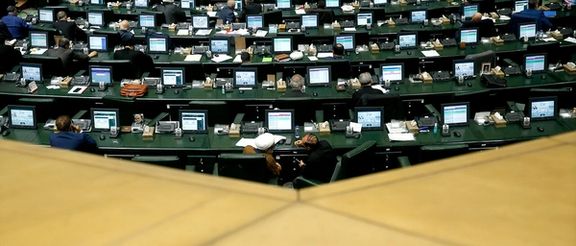
Amid public indifference, politicians and media in Iran are hotly debating the disqualification of some sitting lawmakers ahead of the March parliamentary elections.
As of Sunday, around 40 current members of parliament and several former lawmakers or top officials were barred by the interior ministry from running in the elections.
Some lawmakers, including Jalal Mahmoudzadeh, an MP from Mahabad, have openly blamed President Ebrahim Raisi's government for the massive disqualification of its critics. Others such as former lawmaker Ali Motahari have demanded explanations and insisted on their religious credentials. Yet others such as reformist Massoud Pezeshkian said, "The Interior Ministry has accused me of not believing in the Islamic Republic regime."
Mahmoudzadeh said that the government owned Iran Newspaper has been calling in the last four months for the disqualifications of politicians who have been critical of the Raisi administration.
Massih Mohajeri, the editor of the conservative daily Jomhouri Eslami, has accused the government of disqualifying critics to silence them and their criticism of the Raisi administration's failures. He claimed that 46 current and former MPs have been disqualified simply for criticizing the the adverse economic conditions and other problems created by this government. Meanwhile, he acknowledged that the Interior Ministry, which conducts the first round of candidate vetting, has significantly tightened the net to reduce the number of candidates who can pass through the qualification process.
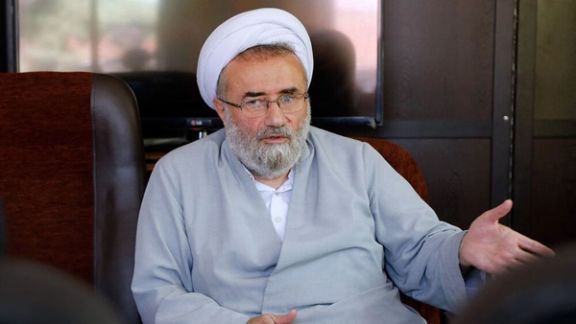
Like many other Iranian politicians, Mohajeri argued that the regime may be attempting to portray the hardliner Guardian Council, which conducts the final round of vetting, as the good cop by having the Interior Ministry do the dirty job. He pointed out that many of those who have been disqualified are regime insiders, indicating that the ruling circle is becoming tighter and smaller.
He stated that the actions of the Interior Ministry resemble the behavior one would expect from totalitarian regimes, such as the one in North Korea. He added that disqualifying this many incumbent MPs constitutes a clear violation of the Constitution. According to him, the result will likely be an even lower turnout than the previous Majles election in 2020, which was the lowest in Iran's modern history.
Mohajeri added that the Interior Ministry has admitted that it has found the critics inside the government to be acting against national security! He asked if more than 40 lawmakers do not believe in the Islamic Republic, what do you expect of them?
Moderate conservative daily Ettela'at which is usually silent about political matters in Iran, warned the government about the perils of the political purification plan which is being pursued by Iran's ultraconservatives and pointed out that the disqualification of incumbent MPs and other regime insiders is part of the same process.
Ettela'at wrote that more than 28 percent of those who had registered their candidacy have been disqualified by the Interior Ministry. Ettela'at wrote that the lawmakers who have been disqualified are precisely those who have tried during the past four years to fulfil their responsibilities. What they have done at the Majles is simply pointing out the inefficiency of government officials.
Etela'at also pointed out that because of the disqualifications, many regime insiders are now concerned about low turnout in the upcoming election. The daily told the ultraconservatives that they can still enter parliament by winning 10 percent of the votes and be proud of a 40 percent or less turnout, but the regime can no longer claim popular support.
According to Khabar Online Website, the Interior Ministry was biased against some of the candidates. The same point was reiterated by the former leader of the centrist Executives of Construction Party Gholamhossein Karbaschi. He further concluded that the government is not looking for a high-turnout election.
As one of the readers of conservative website Alef pointed out , "We voted for your friends four years ago. What did we get other than poverty, misery, and rising prices? On the other hand, conservatives do not want political participation. They lost every time the people participated in the elections." Another reader explained why the people are disillusioned: "During the past 40 years you have always called for people's participation in the months before the elections. You forget the people and their problems as soon as the elections are over."
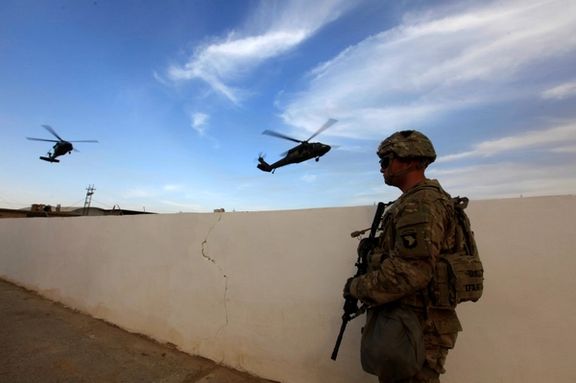
The United States carried out two air strikes in Syria against Iranian targets on Sunday, as a response to a series of attacks against American forces in Syria and Iraq.
Defense Secretary Lloyd Austin announcing the strikes said Iran’s Revolutionary Guard and affiliated militia groups were targeted.
Since the Hamas terror attack on Israel, Iranian proxy groups began targeting US bases in the region. More than 40 drone and rocket attacks were launched injuring dozens of American servicemen. Washington twice launched retaliatory attacks, but apparently neither Tehran nor its affiliated forces were deterred.
Austin said the strikes were conducted against a training facility and a safe house near the cities of Abu Kamal an Mayadin in eastern Syria, where the IRGC has a strong foothold, helping move weapons into Syria and Lebanon.
A US defense officials told Reuters on condition of anonymity that one of the targets was a weapons storage facility. The other was a "command and control" facility, which would suggest a headquarters or other staffed structure.
The official said the strikes took place around midnight local time and a US review was underway to determine whether the strikes killed or wounded any Iran-aligned militia members.
Al-Harir Airbase, located near Erbil and housing US and international forces, was targeted in an armed drone attack, as reported by a security source on Saturday.
US and international forces stationed in Iraq and Syria have heightened their alert status following numerous attacks on their bases since the October 7 terror attack on Israel.
Iran's proxies resumed rocket and drone attacks on US bases in Syria and Iraq, breaking more than a year of relative calm.
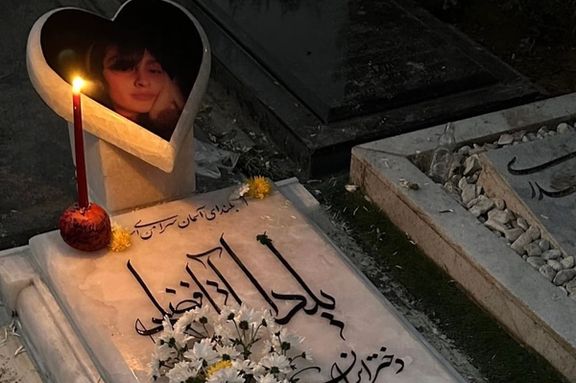
Iranian Security forces are reportedly pressuring families of those killed during protests to cancel their plans for public and even private anniversary ceremonies.
The family of Yalda Agha-Afzali, a young girl who died in suspicious circumstances at her home on November 11 last year in Tehran, five days after being released from prison, are among the families who have cancelled their plans for both private and public ceremonies without any explanation.
Mehrdad Agha-Afzali, Yalda’s father, in an Instagram post Thursday announced that all plans to commemorate her daughter on Friday as previously announced were canceled.
According to social media reports, security forces on Friday denied access, including to her family, to the section of the cemetery where the young girl is buried. A few members of the family and some supporters only managed to visit the grave after nightfall and light candles for her when security forces left.
The 19-year-old, who was arrested during protests in Tehran on October 26, went on a hunger strike at the notorious Qarchak Prison and was freed on November 6. She said she was proud she had not surrendered to pressures to accept any wrongdoing or regret for participating in protests despite having been beaten up.
After her death, authorities claimed the cause of death had been “meta-amphetamine overdose”. She was buried at Tehran’s Behesht-e Zahra Cemetery under very heavy security measures the next day.
An audio file of her conversation with a friend after her release from prison emerged on social media later -- in which she happily said she was proud she had not broken under pressure in prison – gave rise to suspicions over authorities’ explanation of her death or suicide.
The family have been under great pressure since her death by intelligence agencies. Unknown individuals vandalized her grave several times and broke her engraved stone image above it.
At least four other imprisoned young protesters – Maryam Arvin in Sirjan, Arshia Emamgholizadeh in Jolfa, Mina Yaghoubi in Arak, and Abbas Mansouri in Shoush – reportedly committed suicide within a few days after being released from prison last year.
The Pirfalak family has also been under similar pressure about holding anniversary ceremonies for their nine-year-old son, Kian, whose killing on November 15, 2022, in Izeh in southern Iran sparked nationwide outrage, earning the regime the title “child-killer”.
They were forced to hold the ceremony, under tight security measures last week, a week before the actual anniversary. Security forces prevented many who tried to attend by blocking the road.
Kian’s father, has posted a video of the low-key ceremony which shows him on a wheelchair and Kian’s mother, an a number of others, wailing at his grave.
Kian was shot multiple times in the family car during a night of protests. His father, Meysam, was also seriously injured and has been confined to a wheelchair since the incident.
Kian’s mother, Zeynab (Mah-Monir) Molaei-Rad, became a national icon of resistance after making a fiery speech at her son’s burial in which she conveyed a strong message of protest against Supreme Leader Ali Khamenei, who she says was directly responsible for her son’s killing.
The defiant family’s woes became even worse when security forces shot Kian’s 18-year-old cousin Pouya Molaei-Rad on June 11 while he was trying to break their cordon in the family’s home village of Parchestan to reach Kian’s grave to commemorate his 10th birthday.
After his death, security forces had refuse to release his body for burial for days as they demanded the silence of Kian’s mother and other family members on social media.
In the past few months Kian’s mother, once very active on social media, has been silent and rarely appears in public.
Since September 2022, when widespread anti-regime protests broke out, security forces have killed well over 500 civilians and severely wounded hundreds. Many young protesters were targeted by shotgun pellets in the face and lost one or both eyes.

As Iran-backed protests continue to flame unrest in the UK, 70 lawmakers have again urged PM Rishi Sunak to list the IRGC as a terrorist organization.
The debate as to whether or not to designate Iran’s Revolutionary Guard as terrorist, like the US has done, has been a cause of bitter divide in the British parliament, as elsewhere. Iranians in the UK have also long joined the calls.
While individuals and entities related to the IRGC have been issued with sanctions from the UK and nations including Canada, the US and European Union member states, lawmakers say it does not go far enough.
According to The Telegraph, the letter has been signed by Lord Carey, the former Archbishop of Canterbury, as well as Tory grandees Sir Iain Duncan Smith, David Davis and Liam Fox and ex-head of the Army Lord Dannatt.
The group claims there is a “compelling and indisputable” case for proscribing the group to keep the UK and its citizens safe. The US proscribed the IRGC in 2019.
In a statement the group cited Scotland Yard’s claims that Iran has made at least 15 attempts since the start of 2022 to kidnap or even kill British or UK-based “enemies”. Additionally, they pointed out that Ken McCallum, the director general of MI5, has also warned that Tehran is a direct threat to the UK “through its aggressive intelligence services”.
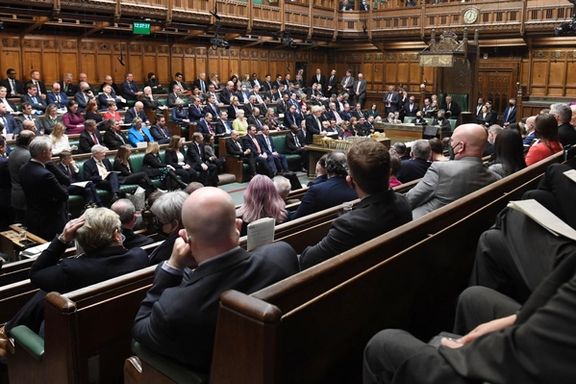
An investigation in The Times revealed that British officials have identified more than half a dozen UK-based groups with direct ties to Tehran amid fears the hostile state is stirring up tension over the conflict in Israel.
The anti-Israel protests have stirred bitter debate in the UK where police have allowed the hundreds of thousands strong protests to continue, while containing more nationalist counter demonstrators.
Suella Braverman, the home secretary, last week accused London’s Met Police of showing bias when it came to demonstrations and of favouring left-wing causes and what she called pro-Palestinian “mobs”, many openly supporting Hamas with little legal ramifications.
The statement from the MPs argues that proscription would be in the interest of national security at home, as well as “peace, stability and justice” in the Middle East, where since the war broke out, Iranian proxies in Syria, Lebanon and Yemen have not only joined the war on Israel, but also attacked US facilities in Syria and Iraq.
Garnering a majority of Iran’s defense budget, since the 1979 revolution, the IRGC has become a major military, political, intelligence and economic force in the country. Its influence has spread not only across the Middle East as it supports Iran’s proxies in the region, but has since seen activity in the likes of the UK and US.
Earlier this year, Iran International’s UK offices were forced to temporarily relocate to Washington after national security agency MI5 said it could no longer protect the team who were under threat from IRGC agents.
In the US, it has also carried out numerous attempted attacks, not least to avenge the assassination of Quds Force Commander, Qassem Soleimani, killed by the US in 2020 under the Trump administration.
The Telegraph reported that in their statement, the parliamentarians argue that the group’s role in providing terrorists with weapons, training and financial support, as well as “fomenting violence and conflict” in the region, is “undeniable”.
“Their actions have exacerbated conflicts and hindered the path to peace,” they said.
“We strongly believe that the proscription of the IRGC is not only a global necessity, but also in the interests of our own national security.”
Foreign Secretary James Cleverly has been reluctant to proscribe the IRGC in the face of increasing calls, not least since the Hamas terror attack on October 7. Iran funds its biggest Palestinian proxy at least $100m a year and supports it with arms, training and technical support.
In the months leading up to the attacks, Iranian leaders had top level meetings with Hamas and Hezbollah chiefs, signalling complicity in the attacks which were the single most deadly day for Jews since the Holocaust.
The British Prime Minister has since come under further pressure to designate the group since the war in Israel. Iranian proxies have become ever more activated, showing the potential threat the IRGC poses not only in the Middle East, but globally.
The parliamentarians’ statement concluded: “We call upon our Government to recognise the urgency of proscribing the IRGC as a terrorist organisation and proceed to do so. Such a decision would constitute a significant step towards peace, stability, and justice in the Middle East and beyond.”
In response to the letter, the UK government spokesman told The Telegraph: “We continue to take strong action against Iran while they threaten people in the UK and around the world. The UK has sanctioned more than 350 Iranian individuals and entities, including the Islamic Revolutionary Guards Corps in its entirety.
“Whilst the Government keeps the list of proscribed organisations under review, we do not comment on whether a specific organisation is or is not being considered for proscription.”
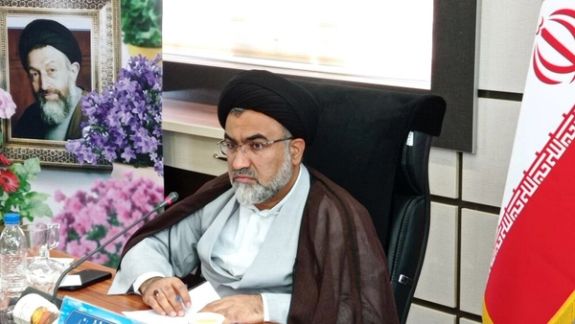
A top Iranian judiciary official has stirred controversy by alleging the involvement of an "organized network" using artificial intelligence to create disruptions in the currency market.
Abdolmehdi Mousavi, the head of Markazi province judiciary, claimed the network, comprising both Iranians and people based outside the country, “leveraged AI to orchestrate fictitious pricing and futures trading of gold and currency through the deployment of robots and the establishment of Telegram channels, all without actual physical exchanges.”
However, Mousavi's claim lacks detailed explanations on how AI could impact the exchange market, leading to skepticism and questioning the credibility of the assertion.
This is not the first instance of the Iranian government attributing currency fluctuations to speculators, resorting to drastic measures, including arrests and executions. Notably, in 2018, two men, including Vahid Mazloumin, dubbed the 'Sultan of Coins' and allegedly found with two tons of gold coins, were executed for illegal currency transactions.
The Iranian government's persistent efforts to control the currency market highlight its desperation to bolster the Iranian rial. Since the United States withdrew from the JCPOA nuclear accord in 2018 and imposed sanctions, the Iranian rial has undergone a 12-fold devaluation.
The devaluation has further compounded the already high inflation rate, prompting more Iranians to seek alternative currencies for their savings.
Despite the government's continued attempts to control the exchange market, the Iranian rial faces ongoing challenges. Currently trading at nearly 510,000 to the US dollar, the currency's value has sharply declined from around 250,000 rials per dollar just one year ago.